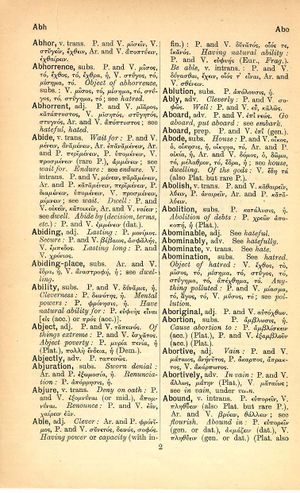able: Difference between revisions
From LSJ
πείθεται πᾶς ἥδιον ἢ βιάζεται (Dio Cassius, Historiae Romanae 8.36.3) → it's always more pleasant to be persuaded than to be forced
mNo edit summary |
mNo edit summary |
||
| Line 2: | Line 2: | ||
|Text=[[File:woodhouse_2.jpg|thumb|link={{filepath:woodhouse_2.jpg}}]]'''adj.''' | |Text=[[File:woodhouse_2.jpg|thumb|link={{filepath:woodhouse_2.jpg}}]]'''adj.''' | ||
[[clever]]: Ar. and P. [[φρόνιμος]], P. and V. [[συνετός]], [[δεινός]], [[σοφός]]. | |||
<b class="b2">Having power</b> or [[capacity]] (with infin.): P. and V. [[δυνατός]], οἷός τε, [[ἱκανός]]. | <b class="b2">Having power</b> or [[capacity]] (with infin.): P. and V. [[δυνατός]], οἷός τε, [[ἱκανός]]. | ||
Revision as of 18:00, 22 September 2017
English > Greek (Woodhouse)
adj.
clever: Ar. and P. φρόνιμος, P. and V. συνετός, δεινός, σοφός.
Having power or capacity (with infin.): P. and V. δυνατός, οἷός τε, ἱκανός.
Having natural ability: P. and V. εὐφυής (Eur., Frag.).
Be able, v. intrans.: P. and V. δύνασθαι, ἔχειν, οἷός τʼ εἶναι, Ar. and V. σθένειν.

